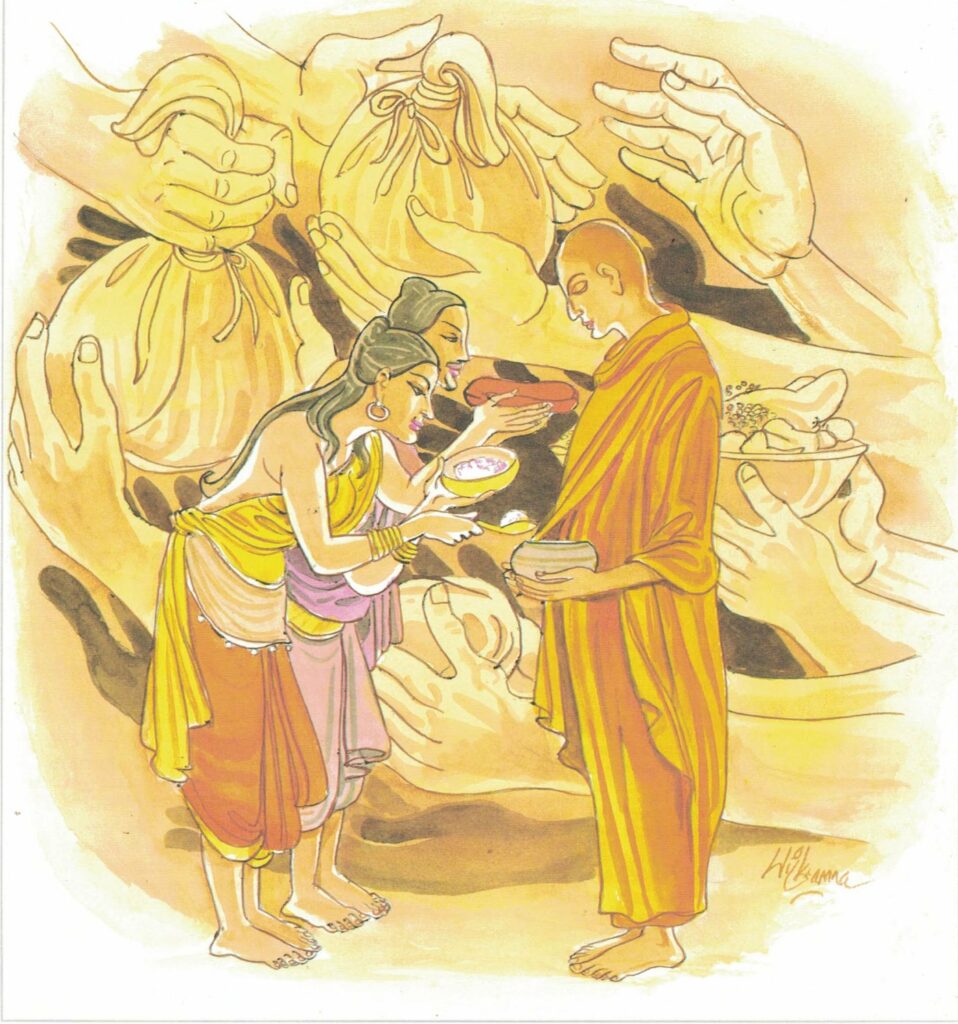Pali text, illustration and English translation of Dhammapada verse 106:
māse māse sahassena yo yajetha sataṃ samaṃ |
ekañca bhāvitattānaṃ muhuttampi pūjaye |
sā yeva pūjanā seyyā yañce vassasataṃ hutaṃ || 106 ||
106. Month by month for a hundred years a thousand one might sacrifice, but if for only a moment one might honour the self-developed, such honour then were better by far than a century of sacrifice.

The Story of Venerable Sāriputta’s Uncle
While residing at the Veluvana Monastery, the Buddha spoke this verse, with reference to a brāhmin, who was the maternal uncle of Venerable Sāriputta.
Venerable Sāriputta once went to his uncle and said, “Brāhmin, do you ever do a single good deed?” I do, Venerable.”
“What do you do?” “Month after month, I give alms to the value of a thousand pieces of money.”
“To whom do you give this money?” “To the naked ascetics, Venerable.”
“And what do you hope to gain thereby?” “I hope to gain the world of Brahma.”
“But is this the way to reach the World of Brahma?” “Yes, Venerable.”
“Who told you so?” “My teachers told me so, Venerable.”
“Brāhmin, neither you nor your teachers know the way to the World of Brahma. The Buddha alone knows the way thereto. Come with me, and I will ask him to tell you the way to the world of Brahma.”
So Venerable Sāriputta took his uncle with him, went to the Buddha, and told him all about it, saying, “Venerable, this Brāhmin said so and so. Be so good as to tell him the way to the World of Brahma.”
The Buddha asked, “Brāhmin, are you correctly reported?” “Yes, Venerable.”
“Brāhmin, though you should give alms in this way for a hundred years, yet were it far more fruitful for a man, with believing heart, for but a single instant to look upon my disciple or to bestow upon him a mere spoonful of boiled rice.”
Explanatory Translation (Verse 106)
yo māse māse sahassena sataṃ samaṃ yajetha
bhāvitattānaṃ ekaṃ ca muhuttaṃ api pūjaye ce
vassasataṃ yaṃ hutaṃ sā pūjanā yeva seyyo
yo: if someone: mase mase: month after month; sahassena: at the expense of a thousand; sataṃ samaṃ [sama]: for a hundred years; yajetha: gives alms: bhāvitattānaṃ [bhāvitattāna]: (but if an individual) with a restrained and disciplined mind; ekaṃ: one noble arahat; ca muhuttaṃ api: even for a moment; pūjaye: adores; ce vassasataṃ [vassasata]: throughout a hundred years; yaṃ hutaṃ [huta]: conducted fire worship; sā pūjanā yeva: that one adoration alone; seyyo [seyya]: is nobler.
One may make sacrifices every month for a hundred years; but, the honour paid to one spiritually developed person, for one moment, is greater than oblations made for a hundred years.
Commentary and exegetical material (Verse 106)
hutaṃ: propitiation; offering. This usage generally denotes the sacrifices made by non-Buddhists. In the days of the Buddha, fire-worship was described as huta. In Vedic Literature of ancient India, ghee thrown into fire as propitiation of the Fire God was described as huta.